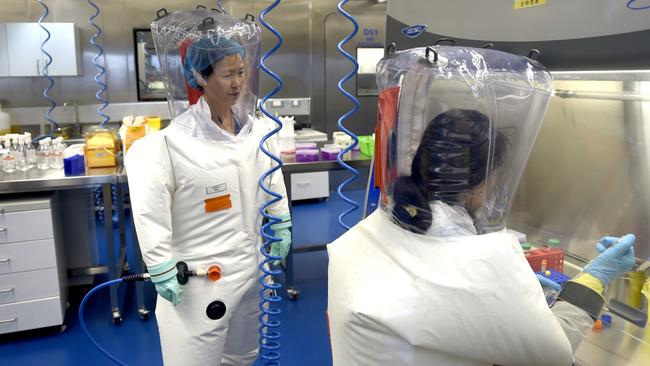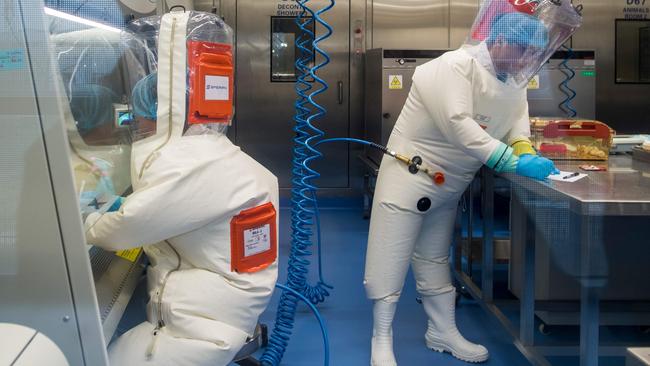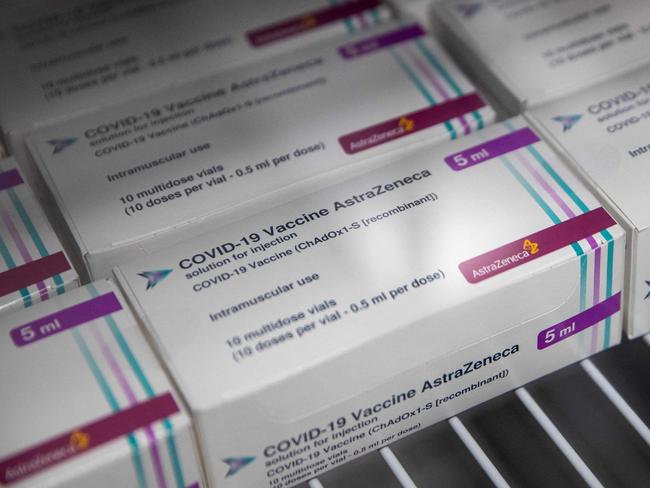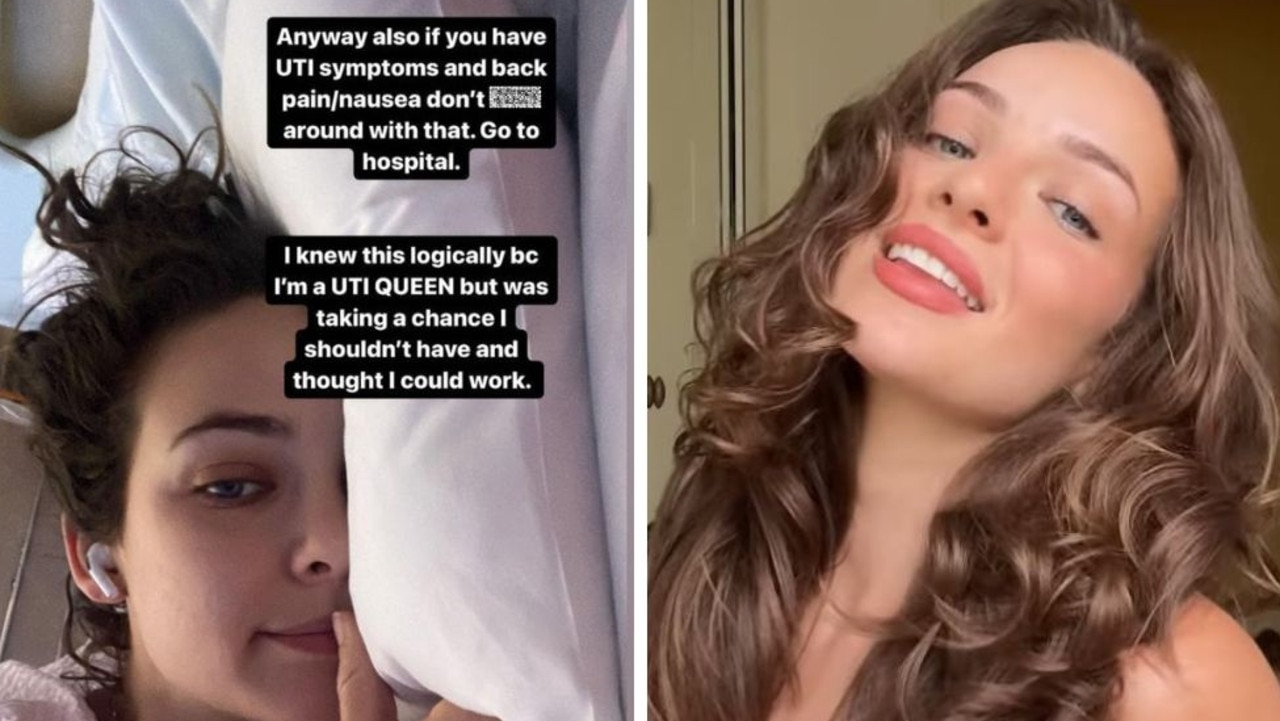Firm linked to Wuhan lab given $92m in US government funding
The US government is under fire over millions of dollars to a group backing coronavirus research in China.

Illness
Don't miss out on the headlines from Illness. Followed categories will be added to My News.
A non-profit group backing coronavirus research in Wuhan, China, has received $US60million ($A92m) in US government funding, it’s been revealed.
The United States Agency for International Development awarded $US4.1 million ($A6.3m) to the EcoHealth Alliance just two weeks ago for a project in Africa, according to public health watchdog White Coat Waste Project.
Nearly $US26 million ($A40m) has also been handed to the firm for projects to “combat or counter Weapons of Mass Destruction”, according to records seen by The Sun.
But despite concerns over its close ties to the Wuhan Institute of Virology – the focus of yet unsubstantiated speculation about the origin of Covid-19 – EcoHealth has continued to receive millions from US government agencies since 2020.
The latest round of funding brings EcoHealth’s total government funding since the coronavirus pandemic began to $US60million ($A92m), with the company using the money to continue collecting and testing hundreds of samples of bat coronaviruses for the past four years.

“Doling out more taxpayer money to EcoHealth after the global disaster it likely started at the Wuhan animal lab is a slap in the face of all Americans and people everywhere, especially days before Peter Daszak is finally hauled before Congress,” WCW Project president Anthony Bellotti said in a statement.
US Senator Joni Ernst told The Sun: “The dangerous experiments on bat coronaviruses that may have caused the Covid pandemic were paid for with tax dollars and funnelled into China’s Wuhan Institute of Virology by EcoHealth Alliance.
He continued: “Even though the shady group refuses to come clean about what really happened in Wuhan, USAID keeps writing the checks to continue their risky research.
“What are taxpayers getting in return for the millions being paid to EcoHealth, other than the possibility of another pandemic?”.

EcoHealth has repeatedly denied that their research in China has any link to the Covid-19 pandemic.
The alliance has previously conducted searches for the deadly Ebola virus in Liberian bats and reportedly plans on establishing a bat colony in the US to experiment with ebola and other viruses.
The company’s boss Peter Daszak is set to testify later this week before the Select Subcommittee on the coronavirus Pandemic over EcoHealth’s partnership with the Wuhan Institute of Virology on bat coronavirus research and his close relationships with top government officials.
In a statement, EcoHealth defended the US funding saying it is focused on environmental conservation in Liberia.
“This grant supports the Liberia Conservation Works (CW) project, a five year program funded by the United States Agency for International Development designed to protect threatened and endangered species by strengthening protected and conserved areas while promoting economic growth in Liberia,” an EcoHealth spokesperson said.
“CW supports communities in becoming less reliant on forest resources by providing livelihood alternatives, including sustainable agriculture and eco-tourism. CW works closely with the Government of Liberia, private sector partners, and local conservation stakeholders and communities,”.
The spokesperson also said EcoHealth is no longer partnering with any Chinese research entities.
COVID VACCINE MAKER ADMITS TO DEADLY SIDE EFFECT
AstraZeneca has acknowledged that its Covid-19 vaccine could cause a rare and potentially deadly blood-clotting condition, according to court documents.
The British pharmaceutical giant is facing a class action from dozens of families of those injured or killed as a result of the jab, which was also given in Australia.
So far, 51 cases have been filed in London’s High Court, estimated to be worth around $190m, according to Britain’s The Telegraph.
But in a twist, AstraZeneca struck a deal with the British government at the height of the pandemic which gives it indemnity from potential lawsuits, meaning taxpayers will have to foot the bill of any payouts.
The company, which is fighting the claims, acknowledged in a February legal document that its vaccine can “in very rare cases” cause a condition called thrombosis with thrombocytopenia syndrome, or TTS, the outlet reports.
TTS occurs when a person has blood clots (thrombosis) together with a low platelet count (thrombocytopenia). It’s also referred to as ‘vaccine-induced immune thrombotic thrombocytopenia’ (VITT).

TTS has been listed as a potential side effect of the vaccine but AstraZeneca’s admission in February is the first time the company has admitted it in court, according to The Telegraph.
In a statement, AstraZeneca defended the positives of the vaccine, saying complications are rare.
“Patient safety is our highest priority, and regulatory authorities have clear and stringent standards to ensure the safe use of all medicines, including vaccines,” the company said in a statement.
“From the body of evidence in clinical trials and real-world data, the AstraZeneca-Oxford vaccine has continuously been shown to have an acceptable safety profile and regulators around the world consistently state that the benefits of vaccination outweigh the risks of extremely rare potential side effects.”
AstraZeneca last Thursday said net profit jumped 21 per cent in the first three months of the year thanks to strong growth in sales of cancer drugs.
Profit after tax climbed more than one fifth compared with the first quarter last year to $2.18 billion, AstraZeneca said in a results statement.
“AstraZeneca had a very strong start in 2024,” chief executive Pascal Soriot said in the statement, which noted a 26-percent increase in revenue from oncology treatments.
Total group sales increased 19 per cent to $12.7 billion in the first quarter.
“Our strong pipeline momentum continued and already this year we announced positive trial results for Imfinzi and Tagrisso that were unprecedented in lung cancer,” added Soriot.
AstraZeneca’s share price jumped 5.7 per cent to £120 following the update.
AstraZeneca’s latest push into oncology comes after its net profit almost doubled to $6 billion last year as a strong cancer division helped offset a wipe-out for sales of its Covid treatments.
– with AFP
Originally published as Firm linked to Wuhan lab given $92m in US government funding



